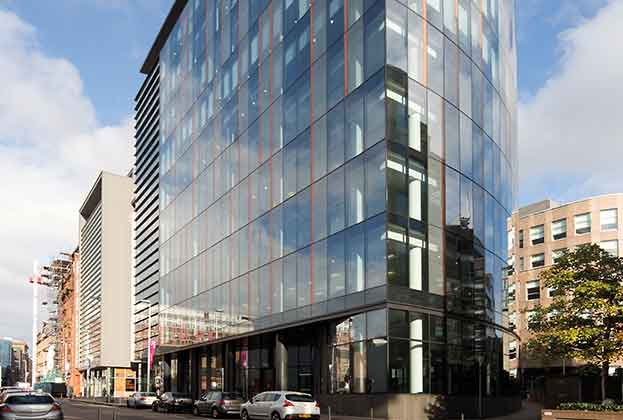Aberdeen is in a strong position to become a global hub for the renewable energy sector
Aberdeen has been considered as the oil capital of Europe since the mid-20th century, and the number of jobs created by the energy industry in and around Aberdeen has been estimated at half a million.
However, with increased pressure on corporations and individuals to make sustainable decisions along with government policies such as Net Zero and the Paris Agreement the demand for oil and gas is on a gradual decline, with the movement towards renewable energy alternatives. This fall in demand was accelerated this year by the Covid-19 pandemic which saw oil prices fall to record lows. Aberdeen’s combination of on and offshore infrastructure, energy companies, a global supply chain, track record of research and development, and a highly skilled workforce means that Aberdeen is at the forefront of making energy transition ambitions a reality.
Earlier this year the Scottish Government set up a £62 million Energy Transition Fund to help the energy sector recover from the duel economic impacts of Covid-19 and the oil and gas price crash. This fund will support businesses in the oil, gas and energy sector over the next five years as they grow and diversify and will attract private sector investment to the region, with its main focus being for the North East. The investment underpins the region's ambition to become a world leader in the transition to net zero and major projects which will be considered for funding include a Global Underwater Hub, Net Zero Solution Centre projects, a Hydrogen Hub, the Acorn Project and an Energy Transition Zone.
The proposed Energy Transition Zone in Aberdeen aims to create a physical place for research and development, test and demonstration and manufacturing activities in an exemplar net zero environment. It will become the focal point for the development of the new energy transition industry cluster in the region. The ambition is to accelerate the delivery of net zero solutions focusing on offshore wind (fixed and floating), hydrogen and carbon capture, usage and storage, catalysing the transition of Aberdeen from a global oil and gas capital to a globally integrated energy cluster. This will help anchor a broad energy supply chain, create and secure high-value jobs, drive export growth and deliver net zero.
Savills expects that the renewable sector will be a significant driver of office take-up in Aberdeen over the next few years
Savills Research
In Aberdeen, the electricity, gas, steam and air sector is forecast to see an employment reduction of 9.4% over the next 10 years, which will create a significant availability of highly skilled workers in Aberdeen. This highly skilled workforce and Aberdeen’s strong reputation in the energy sector is acting as a significant pull factor for occupiers within the renewable sector.
Earlier this year, Equinor signed for 15,000 sq ft at Aberdeen’s Prime Four Business Park. Equinor claim that their extensive history and expertise in the oil and gas industry is helping them to create reusable alternatives, including wind farms and turbines, and emission-free natural gases. Savills expects that the renewable sector will be a significant driver of office take-up in Aberdeen over the next few years, as occupiers take advantage of government policies and the availability of talent in the area, as well as cluster with similar occupiers within all areas of the energy sector.

Marischal Square, Aberdeen. Savills is acting on behalf of the landlord
Outlook: Dan Smith, Business Space, Aberdeen.
Q4 2019 recorded the best take-up in a single quarter since 2014, and we were anticipating a continuation of this performance into 2020. However, the duel implications of Covid-19 and the subsequent impact on the oil market has substantially suppressed office activity in the city.
2020 started well, with take-up in Q1 falling marginally behind the impressive numbers from the previous quarter. However, the demand collapse and oil pricing crash (a direct result of Covid-19 restrictions) has seen the cancellation of a large amount of capital expenditure planned for this year and next, and many projects have been delayed and cancelled. We have seen staff rationalisation and redundancy across the energy sector, and that is expected to increase when the furlough scheme comes to an end in October.
Market uncertainty drives the need for flexibility, and in the short term, we expect to see a continued drive toward flexible lease arrangements. The development pipeline will continue to suffer as a consequence. There will be a continued flight to quality, with occupiers taking advantage of favourable market conditions to improve the quality of their office stock. The requirement to limit capital expenditure will result in increased demand for 'plug and play' and partially fitted out office options.
The 'Energy Transition' and how Aberdeen can position itself in that particular process will have a major impact in the medium/long term fortunes for the city’s office market. There are numerous ongoing initiatives aiming to diversify the local economy, and we are expecting to see increased activity from renewables, hydrogen, carbon capture and life sciences sectors over the coming years. The new life sciences BioHub on Aberdeen’s Foresterhill Health Campus has now begun on site and aims to attract new occupiers to Aberdeen as well as retaining some of the homegrown talents from that sector.
If you have an enquiry regarding the office market in Aberdeen, please contact our Aberdeen office here
Read the articles within Spotlight: Scotland Offices below.
.jpg)

